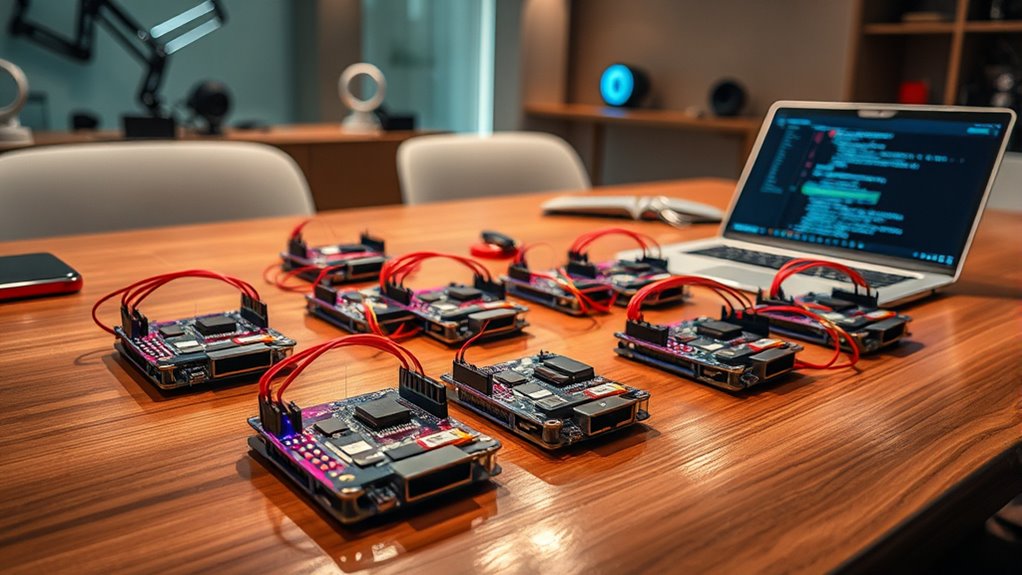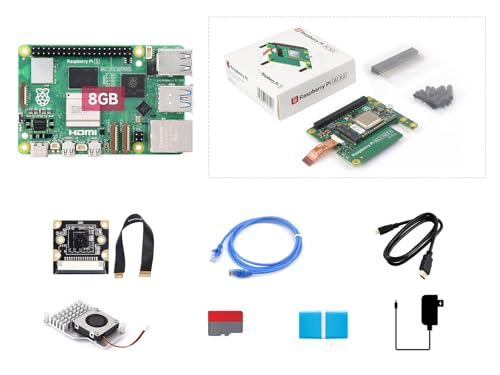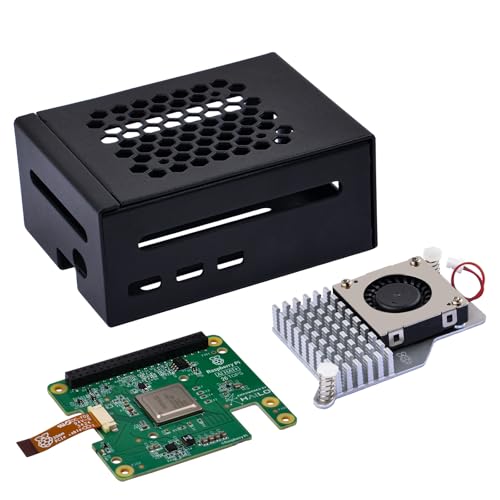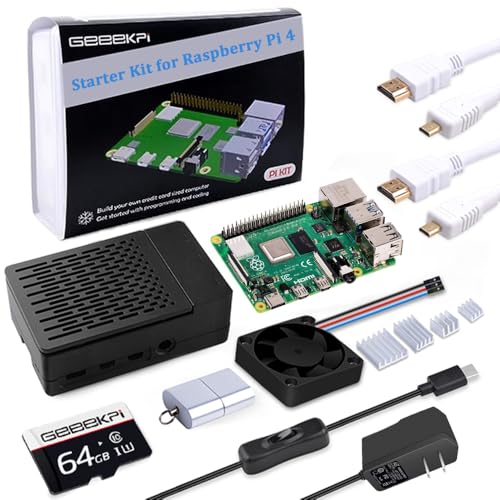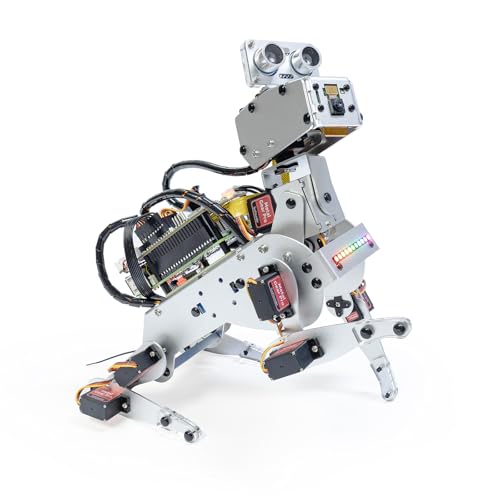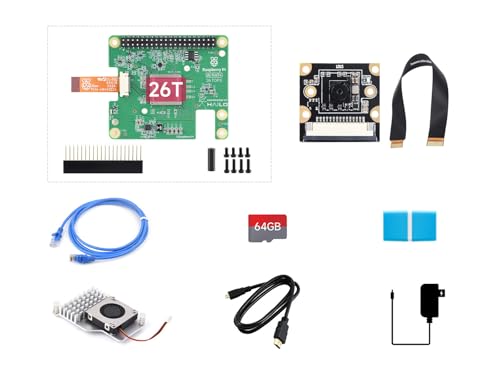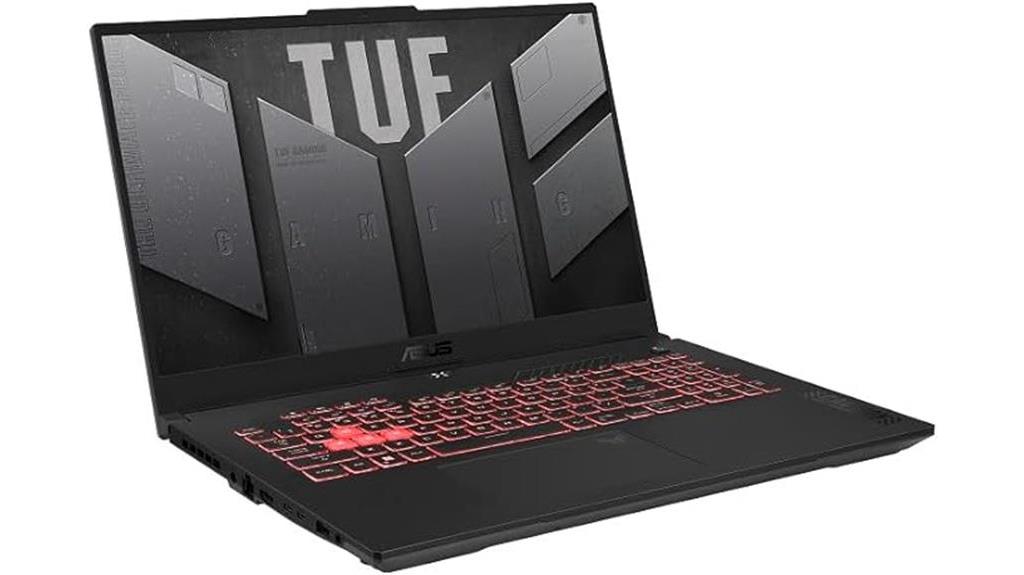If you’re looking to boost your Raspberry Pi projects in 2025, I recommend exploring top AI kits like the Raspberry Pi AI Kit with Hailo AI Module for fast neural inference, along with starter options like the Raspberry Pi 5 kits with 16GB RAM and 128GB SD cards for versatile use. For vision-based projects, the official 12MP AI Camera is excellent. Additionally, all-encompassing bundles like Waveshare and SunFounder kits provide great value. Keep exploring to discover more options tailored for your needs.
Key Takeaways
- High-performance kits like Raspberry Pi 5 with 16GB RAM and advanced AI modules support demanding vision and machine learning projects in 2025.
- All-in-one bundles such as Waveshare PI5 AI kits provide comprehensive hardware and software for seamless AI development.
- Specialized AI modules like Hailo HAT and MX3 Accelerator accelerate neural network inference for real-time vision applications.
- Beginner-friendly kits like SunFounder Raphael and GeeekPi support robotics, IoT, and multimedia projects with extensive tutorials.
- Compatibility with multiple AI frameworks (YOLO, MobileNet) and peripherals ensures versatile project capabilities for diverse applications.
Raspberry Pi AI Kit with M.2 HAT+ and Hailo AI Module
If you’re looking for a Raspberry Pi AI kit that excels at visual recognition tasks, the Raspberry Pi AI Kit with M.2 HAT+ and Hailo AI Module is an excellent choice. It features an M.2 HAT+ with a powerful Hailo AI Module capable of 13 TOPS neural network inference acceleration. The kit is easy to install on a Raspberry Pi 5, supporting camera integrations and multiple AI frameworks like YOLO. It’s perfect for image recognition projects, offering high inference speeds and compatibility with various models. While it’s not meant for language models, it’s ideal for prototyping visual AI applications and learning AI development.
Best For: hobbyists, learners, and prototypers seeking a high-performance visual AI solution for image recognition and object detection on a Raspberry Pi 5.
Pros:
- Easy to install and integrate with Raspberry Pi 5 and camera modules
- Supports multiple AI frameworks like YOLO with high inference speeds (13 TOPS)
- Compact, lightweight, and suitable for learning, prototyping, and visual AI projects
Cons:
- Not designed for large language models or chatbot development
- May require troubleshooting with cables, mounting, and configuration for optimal performance
- Limited software support for complex AI workflows beyond image recognition
Raspberry Pi 5 Starter Kit with 16GB RAM and 128GB Micro SD Card
The Raspberry Pi 5 Starter Kit with 16GB RAM and 128GB Micro SD Card is an excellent choice for both beginners and experienced users looking to plunge into AI projects. It features the latest Raspberry Pi 5 with a powerful 2.4GHz quad-core ARM processor and 16GB DDR4 RAM, delivering three times the performance of previous models. The kit includes a pre-loaded 128GB micro SD card with Raspberry Pi OS, an official Pi 5 case with advanced cooling, and a 27W power supply for stable operation. Its versatility supports various projects, from media centers to home automation, making it a reliable, ready-to-use platform for AI experimentation.
Best For: hobbyists, educators, and developers seeking a high-performance, versatile platform for AI projects, media centers, and DIY electronics.
Pros:
- Powerful 16GB DDR4 RAM and 2.4GHz quad-core ARM processor for advanced multitasking and AI experimentation
- Pre-loaded 128GB micro SD card with Raspberry Pi OS for immediate use and easy setup
- Comprehensive kit with official cooling case and 27W power supply ensures stable, safe operation
Cons:
- Higher price point compared to lower-RAM models, which may be a consideration for budget-conscious users
- Requires additional peripherals for some projects, such as monitors, keyboards, or sensors
- Limited availability may lead to longer wait times or stock shortages in certain regions
Waveshare PI5-8GB AI Kit for Raspberry Pi 5 (Bundle with 9 Items)
Looking to plunge into AI projects with a powerful, all-in-one kit? The Waveshare PI5-8GB AI Kit for Raspberry Pi 5 offers just that, bundled with nine essential items like the Pi 5, a 64GB TF card, cooler, cables, and accessories. The Raspberry Pi 5 itself is a significant upgrade, boasting a 2.4GHz quad-core ARM Cortex-A76 CPU, improved graphics, dual 4K output, and enhanced connectivity. This kit provides a complete package for AI development, making it perfect for enthusiasts and developers eager to explore advanced computing and multimedia projects in 2025.
Best For: AI enthusiasts and developers seeking a comprehensive, high-performance computing kit to explore advanced AI and multimedia projects with Raspberry Pi 5 in 2025.
Pros:
- Complete bundle including the Raspberry Pi 5, 64GB TF card, cooler, and accessories for instant setup
- Powerful Raspberry Pi 5 features a 2.4GHz quad-core ARM Cortex-A76 CPU and dual 4K output for demanding applications
- Supports AI development with libraries and camera compatibility, ideal for innovative projects
Cons:
- Higher price point due to all-in-one package and premium components
- Requires external battery for real-time clock, which is not included in the kit
- Some accessories may need verification for compatibility with specific AI or multimedia peripherals
Waveshare PI5-16GB AI Kit Bundle with Raspberry Pi 5 and Accessories
For those seeking a thorough AI development package, the Waveshare PI5-16GB AI Kit Bundle with Raspberry Pi 5 and accessories stands out as an excellent choice. This bundle includes the powerful Raspberry Pi 5, a 64GB TF card, cooling solution, cables, and essential accessories, all designed for AI applications. The Raspberry Pi 5 features a quad-core 2.4GHz ARM Cortex-A76 CPU, advanced multimedia support, dual 4K output, and extensive connectivity options. With its all-encompassing package, this kit simplifies setup and boosts performance, making it ideal for AI projects, multimedia, and peripheral-intensive tasks. It’s a versatile, ready-to-go solution for developers and enthusiasts alike.
Best For: enthusiasts and developers seeking a comprehensive AI development solution with powerful hardware and extensive connectivity for multimedia and peripheral-intensive projects.
Pros:
- All-in-one bundle including Raspberry Pi 5, accessories, and a 64GB TF card for quick setup.
- Advanced multimedia features with dual 4K output and HEVC decoding, ideal for multimedia tasks.
- Robust connectivity options including dual-band Wi-Fi, Bluetooth 5.0, USB 3.0, PCIe, and GPIO for versatile applications.
Cons:
- Slightly higher price point due to the comprehensive bundle and accessories.
- Limited availability with a future release date (August 21, 2024), which may affect immediate purchase plans.
- Requires some technical knowledge for optimal setup and integration into complex AI projects.
CanaKit Raspberry Pi 5 Starter Kit PRO (128GB Edition)
If you’re seeking a powerful and ready-to-go Raspberry Pi setup for AI projects, the CanaKit Raspberry Pi 5 Starter Kit PRO (128GB Edition) stands out as an excellent choice. It features the Raspberry Pi 5 with an 8GB RAM, a fast MediaTek processor, and a pre-loaded 128GB SD card with Raspberry Pi OS. The kit includes essential accessories like a case, heatsinks, active cooling fan, and HDMI cables supporting 4K, ensuring stable performance during demanding tasks. Users praise its ease of setup, build quality, and versatility for projects like home automation, web hosting, and server monitoring. Overall, it offers great value and reliable performance for both beginners and enthusiasts.
Best For: hobbyists, developers, and enthusiasts seeking a powerful, ready-to-use Raspberry Pi 5 setup for AI, media projects, and home automation.
Pros:
- Includes a high-performance Raspberry Pi 5 with 8GB RAM and pre-loaded 128GB SD card for quick deployment
- Comes with comprehensive accessories like case, heatsinks, active cooling fan, and 4K HDMI cables for optimal setup and stability
- Excellent value with positive user feedback on performance, build quality, and ease of use
Cons:
- Initial setup may cause confusion for beginners, especially regarding SD card placement
- Missing detailed documentation or instructions for some components or assembly steps
- Limited warranty period of 30 days, which may not cover long-term issues
GeeekPi AI HAT+ for Raspberry Pi 5 with Hailo AI Accelerator
The GeeekPi AI HAT+ for Raspberry Pi 5 with Hailo AI Accelerator stands out as an ideal choice for developers and hobbyists seeking high-performance AI capabilities in a compact package. It features a built-in neural network accelerator delivering 26 TOPS, making it perfect for advanced applications like object detection and pose estimation. The kit includes a metal case, active cooler, and easy-to-assemble accessories, ensuring reliable performance and protection. With seamless compatibility via the PCIe Gen 3 interface and support for Raspberry Pi OS, this AI HAT+ transforms your Pi 5 into a powerful, energy-efficient AI device ready for complex tasks.
Best For: developers and hobbyists looking to build high-performance, energy-efficient AI projects using Raspberry Pi 5 with powerful neural network acceleration.
Pros:
- Delivers 26 TOPS neural network processing power for advanced AI applications.
- Includes a metal case and active cooler for reliable performance and protection.
- Seamless compatibility with Raspberry Pi OS via PCIe Gen 3 interface simplifies setup.
Cons:
- Requires careful assembly with stacking headers, spacers, and screws.
- Limited to users familiar with Raspberry Pi hardware and AI development.
- Availability may be limited initially, with a first release date of November 21, 2024.
GeeekPi Raspberry Pi 4 Starter Kit with Accessories
The GeeekPi Raspberry Pi 4 Starter Kit with Accessories stands out as an excellent choice for beginners and hobbyists keen to plunge into AI and IoT projects. It features a powerful Raspberry Pi 4B with a 64-bit quad-core CPU, 4GB RAM, and 4K support, delivering smooth performance for media, gaming, or Linux development. The kit includes a sturdy case, quiet fan, heatsinks, a high-speed 64GB SD card, and essential cables, making setup straightforward. While some users note fan noise and SD card longevity concerns, overall, the components are high quality, and the kit offers great versatility for various projects.
Best For: hobbyists, students, and beginners interested in exploring AI, IoT, media centers, and Linux projects with a ready-to-use, versatile Raspberry Pi 4 starter kit.
Pros:
- Complete package with high-quality components including a sturdy case, quiet fan, heatsinks, and a high-speed SD card.
- Easy setup and assembly, suitable for users of all experience levels.
- Supports 4K resolution and runs smoothly on Linux for multimedia, gaming, and development projects.
Cons:
- Fan noise may be loud at default settings, requiring modifications for quieter operation.
- Limited SD card lifespan concerns, with some users experiencing read-only modes after extended use.
- Micro HDMI cables included may have connectivity issues, necessitating backup cables or replacements.
iRasptek Starter Kit for Raspberry Pi 5 with 16GB RAM and 256GB Raspberry Pi OS
Designed for users seeking a ready-to-go AI development platform, the iRasptek Starter Kit for Raspberry Pi 5 delivers impressive performance with 16GB of RAM and a 256GB pre-installed Raspberry Pi OS. Its powerful 64-bit quad-core Cortex-A76 processor at 2.4GHz boosts CPU performance markedly over previous models. The upgraded VideoCore VII GPU supports dual 4Kp60 displays, perfect for high-quality visuals. The kit features a durable aluminum enclosure, an active cooler for heat management, and a stable 27W power supply with multiple USB ports. Overall, it offers a reliable, high-performance system ideal for AI projects, multimedia, and industrial applications right out of the box.
Best For: tech enthusiasts and developers seeking a high-performance, ready-to-use AI and multimedia platform with robust hardware and stability.
Pros:
- Powerful 64-bit quad-core Cortex-A76 processor at 2.4GHz for enhanced performance
- Supports dual 4Kp60 HDMI displays with upgraded VideoCore VII GPU for superior visuals
- Durable aluminum enclosure with active cooling system ensures stable operation and heat management
Cons:
- Higher cost compared to standard Raspberry Pi models due to premium components and enclosure
- Limited upgradeability; built-in hardware specifications are fixed
- May require additional accessories or peripherals for specific advanced applications
Raspberry Pi AI Camera
If you’re looking to add high-quality vision capabilities to your Raspberry Pi projects, the Raspberry Pi AI Camera stands out with its 12.3 MP Sony IMX500 sensor and neural network accelerator. It features a low-power inference engine and is pre-loaded with the MobileNet vision model, making it ideal for image processing and object detection. The camera supports multiple sensor modes, including 4056×3040 at 10fps and 2028×1520 at 30fps, with a 76-degree field of view and adjustable focus. Compact and lightweight, it connects easily with Raspberry Pi devices, enabling seamless integration into diverse AI and machine vision projects.
Best For: hobbyists, developers, and researchers seeking high-resolution AI-powered vision capabilities for Raspberry Pi projects.
Pros:
- High-quality 12.3 MP Sony IMX500 sensor with neural network acceleration for advanced image processing.
- Supports multiple sensor modes and adjustable focus, suitable for diverse applications.
- Compact, lightweight design with easy connectivity to Raspberry Pi devices.
Cons:
- Initial setup may require additional configuration like increasing VRAM and installing drivers.
- Some users have reported challenges with driver installation depending on monitor configurations.
- Limited information on long-term support and firmware updates from the manufacturer.
MX3 M.2 AI Accelerator
For those seeking high-performance AI processing in compact systems, the MX3 M.2 AI Accelerator stands out as a top choice. Designed for PCI-SIG M.2 M-key 2280 slots, it easily integrates into existing setups like the Raspberry Pi 5 with compatible HATs. It handles demanding computer vision tasks with remarkable speed and efficiency, all while being energy-conscious. Supported on Windows and Linux, it offers an all-encompassing SDK and documentation to streamline development. Whether you’re building embedded or edge AI solutions, the MX3 M.2 AI Accelerator delivers powerful performance without sacrificing power efficiency, making it an excellent addition to your AI toolkit.
Best For: embedded system developers and AI practitioners seeking high-performance, energy-efficient computer vision solutions in compact form factors.
Pros:
- Compatible with multiple operating systems including Windows and Linux, offering versatile deployment options
- Easy integration into existing systems like Raspberry Pi 5 via M.2 M-key 2280 HATs
- Optimized for high-performance AI workloads with efficient power consumption
Cons:
- Requires compatible hardware slots (PCI-SIG M.2 M-key 2280) for installation
- May need development expertise to fully utilize SDK and software resources
- Limited to M.2 M-key 2280 form factor, restricting compatibility with some older or different hardware configurations
SunFounder PiDog AI Robot Dog Kit for Raspberry Pi 4/3B+/3B/Zero 2W
The SunFounder PiDog AI Robot Dog Kit stands out as an excellent choice for hobbyists, students, and engineers interested in building a realistic, interactive robot dog using a Raspberry Pi. It supports Raspberry Pi 4B, 3B+, 3B, and Zero 2W models, featuring 12 servos that enable 32 expressive actions like walking, sitting, wagging, and tricks. Equipped with sensors for vision, hearing, and touch, PiDog can recognize gestures, avoid obstacles, and respond to voice commands via ChatGPT-4o integration. With extensive tutorials, app control, video recognition, and Python programming support, this kit offers an engaging, educational robotics experience suitable for all skill levels.
Best For: hobbyists, students, and engineers seeking a versatile, interactive robot dog kit compatible with Raspberry Pi for educational, hobbyist, and development projects.
Pros:
- Supports multiple Raspberry Pi models including 4B, 3B+, 3B, and Zero 2W, offering broad compatibility.
- Equipped with 12 servos and diverse sensors for realistic movements and interactive capabilities like vision, sound, and touch recognition.
- Provides extensive tutorials, app control, Python programming support, and active community support for easy learning and customization.
Cons:
- Assembly involves about 70 steps, which may require patience and dexterity, especially for small parts.
- Limited leg movement (only forward/backward), restricting turning to wide, slow maneuvers.
- Some users report servo faults or power issues, necessitating troubleshooting and support.
SunFounder Raphael Starter Kit for Raspberry Pi 5, 4B, 3B B+, Zero 2 W (Raspberry Pi Not Included)
Looking for an all-inclusive Raspberry Pi kit that caters to beginners and educators alike? The SunFounder Raphael Starter Kit is perfect, supporting Raspberry Pi 5, 4B, 3B+/3B, Zero 2 W (not included). With over 337 components, it supports 161 projects and features 70+ tutorial videos by educator Paul McWhorter. The kit includes sensors, actuators, LEDs, LCDs, and accessories like a camera and breadboard. While some components are fragile, the extensive online resources, wiring diagrams, and multi-language coding support make it ideal for self-paced learning, electronics, and IoT projects for ages 10 and up.
Best For: beginners, educators, and hobbyists seeking a comprehensive and versatile Raspberry Pi learning platform to explore electronics, programming, and IoT projects.
Pros:
- Over 337 components supporting 161 projects with extensive online tutorials and coding resources.
- Compatible with multiple Raspberry Pi models and supports programming in Python, C, Java, Node.js, and Scratch.
- Includes diverse hardware such as sensors, actuators, LEDs, LCDs, and accessories like a camera and breadboard for hands-on learning.
Cons:
- Some components like the breadboard and camera are fragile and may break over time.
- Minimal wiring instructions and potential library setup issues can challenge complete beginners.
- Components may be mislabeled or require additional wiring tools and storage solutions for optimal use.
Waveshare AI Kit for Raspberry Pi 5 Bundle (8 Items)
If you’re seeking a thorough AI kit tailored for advanced Raspberry Pi 5 projects, the Waveshare AI Kit stands out with its all-in-one bundle of eight carefully selected items. It includes the Raspberry Pi AI HAT+ 26T, PI5-IMX219-77 camera, cooler, 64GB TF card, and other essential accessories, providing everything needed for AI development. The Raspberry Pi 5 itself offers a 2-3x CPU performance boost, dual HDMI outputs, and support for high-speed data and peripherals. With its Linux OS and robust hardware, this bundle is perfect for AI enthusiasts aiming to build powerful, feature-rich projects. It’s a comprehensive package that simplifies AI experimentation on the latest Raspberry Pi platform.
Best For: AI enthusiasts and developers seeking a comprehensive, ready-to-use hardware bundle for advanced projects on the Raspberry Pi 5 platform.
Pros:
- Includes all necessary components for AI development, such as the Raspberry Pi AI HAT+ 26T and high-quality camera.
- Offers robust hardware specifications with a 2-3x CPU performance boost and multiple high-speed connectivity options.
- Comes with a 64GB TF card and accessories, simplifying setup and experimentation.
Cons:
- Price and availability may vary, potentially making it less accessible for some users.
- Limited information on software support or pre-installed AI frameworks included in the bundle.
- Requires additional components like a power supply or display for complete setup, which are not specified in the bundle.
Official RPi AI Camera, 12MP, IMX500 Intelligent Vision Sensor
For anyone building advanced vision-based AI projects with Raspberry Pi, the Official RPi AI Camera featuring the 12MP IMX500 Intelligent Vision Sensor stands out as a top choice. It’s compact, versatile, and compatible with all Raspberry Pi models, including Pi 5 and Pi 4B. The sensor offers sharp images with a 78.3° field of view, manual focus, and real-time neural network inferencing thanks to onboard AI processing. This means you can run object detection and recognition directly on the sensor without external hardware. Priced around $70, it’s an excellent tool for developers aiming to integrate intelligent vision capabilities into their projects seamlessly.
Best For: developers and hobbyists seeking to build advanced, AI-powered vision applications with a compact, Raspberry Pi-compatible camera featuring onboard neural network processing.
Pros:
- Onboard AI inference enables real-time object detection and recognition without external hardware
- Compatible with all Raspberry Pi models, including Pi 5 and Pi 4B, with easy integration
- High-resolution 12.3MP sensor and adjustable focus provide sharp, detailed images
Cons:
- Moderate customer satisfaction ratings (average 3.0/5 stars) may indicate some user experience issues
- Price point around $70 might be steep for budget-conscious users
- Limited information on software ecosystem and support for advanced AI development
SunFounder PiCar-X AI Video Robot Car Kit with Raspberry Pi Zero 2 W+32G TF Card
The SunFounder PiCar-X AI Video Robot Car Kit with Raspberry Pi Zero 2 W+32G TF Card is an excellent choice for beginners who want to plunge into robotics and programming. It features an open-source platform that encourages exploration, creativity, and learning, making it perfect for students and hobbyists. With built-in AI capabilities like voice interaction, visual recognition, and gesture control through ChatGPT-4o, the robot becomes smarter and more engaging. Its rich set of modules, including obstacle avoidance, a camera, and TTS, supports customization. Plus, its straightforward assembly and support resources make it accessible for all skill levels, fostering hands-on learning and experimentation.
Best For: beginners, students, and hobbyists interested in exploring robotics, programming, and electronics through an open-source, customizable AI robot car kit.
Pros:
- Open-source platform fosters creativity and hands-on learning in robotics and programming
- Equipped with advanced AI features like voice interaction, visual recognition, and gesture control via ChatGPT-4o
- Supports multiple programming languages (Python and Scratch) for skill development and project customization
Cons:
- Assembly may require some guidance for complete beginners despite straightforward instructions
- Advanced features and customization options might be overwhelming for very young users or complete novices
- Dependence on additional resources and community support for troubleshooting and project enhancement
Factors to Consider When Choosing Raspberry Pi AI Kits
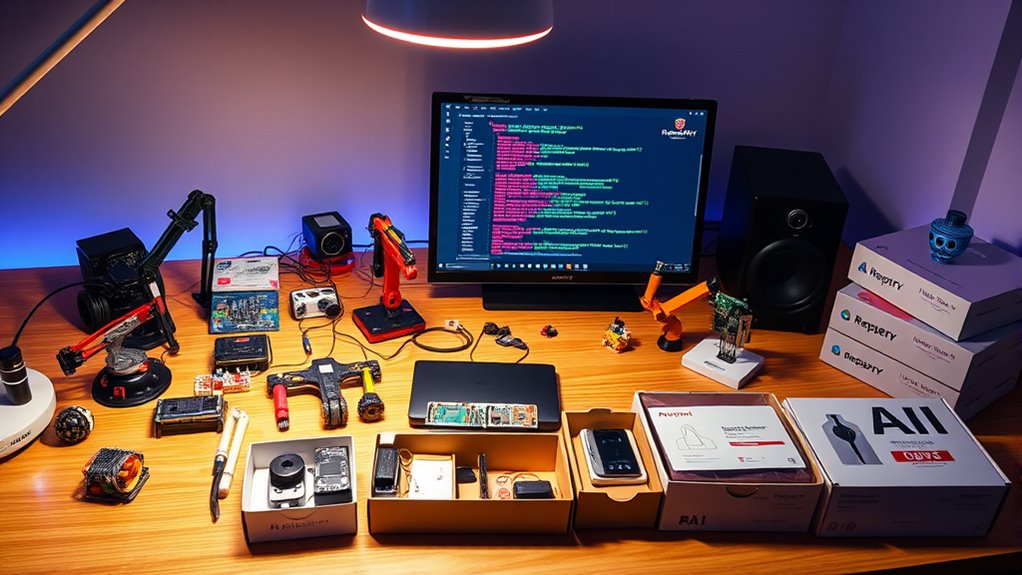
When choosing a Raspberry Pi AI kit, I consider how well it fits my project needs, including compatibility and processing power. I also look at hardware expandability, software support, and whether it’s easy to power and cool. These factors help guarantee I pick a kit that’s reliable and suits my skills and goals.
Compatibility With Projects
Choosing the right Raspberry Pi AI kit depends heavily on guaranteeing compatibility with your specific project needs and hardware setup. First, verify that the kit matches your Raspberry Pi model, whether it’s Pi 4, Pi 5, or Zero 2 W, to guarantee proper fit and function. You also need to confirm that the AI kit supports your intended applications, like image recognition or gesture control. Seamless integration with your existing software ecosystem—libraries like OpenCV, TensorFlow, or Picamera2—is vital. Additionally, check that the hardware interfaces, such as GPIO, PCIe, CSI, or DSI, align with your peripherals and sensors. Finally, guarantee the firmware or OS support is compatible with your development environment for a smooth setup and operation.
Processing Power & Speed
Processing power and speed are vital factors that determine how effectively a Raspberry Pi AI kit can handle demanding tasks. The CPU’s core count, clock speed, and architecture directly impact data analysis and processing speed. Neural network accelerators or dedicated AI chips boost inference, enabling real-time applications like image recognition and object detection. Higher TOPS ratings reflect greater AI processing ability, allowing complex models to run efficiently. The interface connecting the AI module—such as PCIe or USB—also matters, as faster data transfer improves system responsiveness. Ultimately, higher processing speeds reduce latency, which is essential for applications requiring immediate decision-making or live data analysis. Choosing a kit with robust processing power ensures smoother performance and more reliable AI functionality in your projects.
Hardware Expandability Options
Evaluating hardware expandability options is essential to guarantee your Raspberry Pi AI kit can grow with your project needs. I look for kits that support additional hardware modules like cameras, sensors, or external accelerators through interfaces such as PCIe, M.2, or GPIO pins. Compatibility with expansion boards or HATs that add functionalities like audio, extra storage, or motor control is also critical. I check if software support and driver updates are readily available to ensure seamless hardware integration within the operating system. The hardware design should allow for easy physical addition of components, including proper mounting and cooling options. Finally, I consider connectivity options like USB, Ethernet, or wireless interfaces, which are indispensable for integrating peripherals and expanding the system’s capabilities efficiently.
Software & Support Resources
Having robust software and support resources is crucial when selecting a Raspberry Pi AI kit, as they directly impact your development experience and project success. I look for kits that offer extensive software support, including drivers, SDKs, and libraries compatible with popular AI frameworks like TensorFlow, PyTorch, or OpenVINO. Detailed documentation, tutorials, and example projects make setup and troubleshooting easier, saving time and frustration. Active community forums, user groups, or official support channels are invaluable for prompt assistance and shared insights. I also check if the software ecosystem supports my preferred programming languages like Python, C++, or Java for seamless integration. Regular software updates and firmware releases ensure I stay current with new features, security patches, and compatibility with evolving AI models.
Power & Cooling Needs
Choosing the right Raspberry Pi AI kit means paying close attention to power and cooling requirements, especially when working with high-performance modules like Hailo or MemryX. A stable power supply is essential to keep the system running smoothly during intensive AI tasks. High TOPS modules generate a lot of heat, so effective cooling solutions like active fans or heatsinks are necessary to prevent thermal throttling and extend hardware lifespan. As workloads increase, so do power and cooling demands, requiring higher wattage supplies and better thermal management. Proper cable selection and mounting height also play roles in ensuring stable power delivery and efficient heat dissipation. Neglecting these factors can lead to system instability or hardware damage, making them vital considerations for any serious AI project.
Frequently Asked Questions
Which Raspberry Pi AI Kit Offers the Best Performance for Real-Time Processing?
You’re asking about the best Raspberry Pi AI kit for real-time processing. I found that the NVIDIA Jetson Nano Developer Kit surpasses others in speed and efficiency, thanks to its powerful GPU and optimized architecture. It handles real-time tasks like object detection and speech recognition smoothly. If you’re serious about performance, I’d recommend investing in this kit because it offers excellent processing power and flexibility for various AI projects.
Are All Kits Compatible With the Latest Raspberry Pi 5 Model?
Not all Raspberry Pi AI kits are immediately compatible with the latest Pi 5 model. I recommend checking each kit’s specifications and manufacturer updates to guarantee compatibility. Some kits might require adapters or firmware updates. I always advise visiting the official Raspberry Pi website or the kit’s support page before purchasing. Staying informed helps me avoid compatibility issues and ensures I get the most out of my projects.
Do These Kits Include Necessary Software or Just Hardware Components?
When I look at AI kits, I find they vary—some include everything from hardware to pre-installed software, making setup easier, while others just offer hardware components. I always check what’s included before buying, so I know if I need to source additional software or if it’s ready to go. This way, I save time and avoid surprises, ensuring my project gets off the ground smoothly.
What Is the Recommended Skill Level for Setting up Advanced AI Kits?
I’ve found that setting up advanced AI kits really depends on your experience. I’ve seen beginners struggle, but I believe with patience, even newcomers can succeed. If you’re comfortable with programming, Linux, and basic electronics, you’ll find it easier. For those new to these skills, I recommend starting with simpler kits first. Confidence grows with practice, and I promise, the reward of building complex AI projects is worth the effort.
Can These Kits Be Expanded With Additional Sensors or Modules?
Absolutely, these kits can be expanded with additional sensors or modules. I often add cameras, microphones, or environmental sensors to customize my projects. Most Raspberry Pi AI kits are designed with open ports and compatible interfaces, making it straightforward to connect extra components. This flexibility allows me to enhance functionality, experiment, and create more complex, tailored AI applications easily.
Conclusion
Choosing the right Raspberry Pi AI kit feels like a fortunate coincidence—each one revealing new possibilities I hadn’t expected. Whether it’s advanced sensors or compact design, these kits seem to find me just when I need them most. As I explore these options, I realize that luck often favors those who prepare. With the right kit, I’m ready to plunge into the future of AI projects, turning chance into innovation every step of the way.

